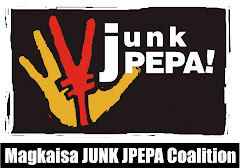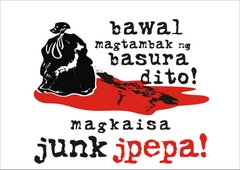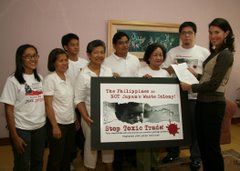 Manila, Philippines. -- Activists dressed in hazardous materials suits and gas masks open a golden treasure chest marked JPEPA. The treasure chest, when opened, reveals samples of wastes that will be given preferrential tariff rates under the controversial treaty. Public health and environmental groups under the Magkaisa Junk JPEPA Coalition urged the Senate and the public to be more vigilant about the toxic wastes issue, especially in the wake of a recent media blitz selling the notes as sufficient to protect the county from the entry of toxic and hazardous wastes from Japan. Photo by Gigie Cruz/GAIA.
Manila, Philippines. -- Activists dressed in hazardous materials suits and gas masks open a golden treasure chest marked JPEPA. The treasure chest, when opened, reveals samples of wastes that will be given preferrential tariff rates under the controversial treaty. Public health and environmental groups under the Magkaisa Junk JPEPA Coalition urged the Senate and the public to be more vigilant about the toxic wastes issue, especially in the wake of a recent media blitz selling the notes as sufficient to protect the county from the entry of toxic and hazardous wastes from Japan. Photo by Gigie Cruz/GAIA.Senate Review OF JPEPA DIPLOMATIC Notes URGED
Toxic and Radioactive Waste Dumping Still Possible
August 30, 2007. Manila, Philippines. Public health and environmental groups [1] from the Magkaisa Junk JPEPA Coalition held a sectoral briefing today to elaborate on the current issues surrounding toxic and radioactive wastes under the Japan-Philippines Economic Partnership Agreement (JPEPA). The groups were wary of the media blitz orchestrated by proponents of the JPEPA selling the recent exchange of diplomatic notes between Japan and the Philippines as enough to cure any defects that the JPEPA may have on the issue of toxic wastes. The groups also cautioned the public against jumping to hasty conclusions based on incomplete information.
According to the group, the exchange of diplomatic notes between the two countries last May 22 and 23, 2007, wherein Japan promises not to export toxic wastes to the Philippines as defined by Philippine and Japanese law and in accordance with the Basel Convention, is a palliative that is insufficient in scope and a non-answer to the continuing concern over toxic and radioactive wastes and materials dumping.
"The exchange of diplomatic notes is simply a reiteration of the status quo gift wrapped in a new package. The Philippines is still open to the dangerous wastes from Japan in the guise of 'recyclable materials'," said Atty. Richard Gutierrez of the Basel Action Network, Asia-Pacific. "The Basel Convention, by itself, does NOT prohibit toxic wastes exports. If Japan were truly sincere, why doesn't it simply ratify the Basel Ban Amendment [i] and put real legal weight on its commitment?"
At the briefing, two volunteers dressed in hazardous materials suits presented a gold treasure chest marked JPEPA to the members of the media. Upon opening the treasure chest, smoke oozed out and a pile of e-waste and other garbage, representing toxic waste, was found inside. Signs promptly indicating that the contents were toxic popped out of the lid. Presenters at the briefing used the tableaux to highlight Japanese deception in the issuance of the notes.

Photo by Gigie Cruz/GAIA.
Gutierrez cited data of toxic waste dumping from companies in Japan to the Philippines, China, Thailand, and India. He also highlighted the cases of toxic waste dumping within Japan that continues unabated, putting to question Japan's ability to deal with its own toxic wastes within its borders and Japan's lethal policy of allowing toxic laden end-of-life vessels to end up in poorer countries. "There is a strong history of Japanese toxic waste dumping in Asia, in spite of their laws, the Basel Convention, and the laws of the country they dumped on," said Gutierrez. "The Philippine government should make it more difficult for Japan to exports its toxic wastes, and ratify the Basel Ban Amendment immediately and join the ranks of China, Malaysia, Indonesia, and Brunei here in Southeast Asia."
Other pressing concerns were also raised, particularly the radioactive wastes and materials favored under JPEPA. "The government seems to have forgotten the matter of radioactive wastes and materials being preferentially treated under JPEPA," cautions Ms. Beau Baconguis of Greenpeace Southeast Asia. "The same market incentives driving toxic wastes will also apply to the radioactive wastes and materials peddled by the JPEPA. The threat to Filipino public health and environment posed by Japanese radioactive wastes is equally as grave as that posed by toxic wastes, and is NOT addressed at all in the exchange of notes."
The Basel Convention covers the export of toxic wastes, but specifically excludes radioactive wastes and materials [ii] from its scope. The civil society groups are also wary of the implications the lowered tariff on radioactive materials could bring, especially with renewed talks on the use of nuclear energy re-surfacing in the archipelago. Without any national mandate obtained through a transparent and democratic process, no incentive should accrue to the nuclear energy sector by reason of any agreement, directly or indirectly, noted the environmental groups.
"Before it was toxic wastes, now its radioactive wastes. What's next? How much patchwork will it take for the government to admit that there are a lot of very serious holes in the JPEPA?" asks Mr. Manny Calonzo of the Global Alliance for Incinerator Alternatives (GAIA). "It's high time that we should stop this mad dash for the cliff. The upcoming hearings in the Senate should not only expose all the flaws of the JPEPA, but also allow the Philippine government to reflect and act on what the Filipino's interests really are, not Japan's."
- End -
Contact:
Ms. Beau Baconguis , Greenpeace Southeast Asia, in Manila at: Tel: +63 917 8036077; email: bbacongu@ph.greenpeace.org
Atty. Richard Gutierrez , Basel Action Network, Asia-Pacific, in Manila at: Tel. No. +63 917 506 7725, e-mail: rgutierrez@ban.org
Mr. Manny Calonzo , Global Alliance for Incinerator Alternatives, in Manila at: Tel. No. +63 922 828 6343, e-mail: manny@no-burn.org.
[1] The groups include: Basel Action Network, Asia-Pacific (BAN AP); Eco-Waste Coalition (EcoWaste); Global Alliance for Incinerator Alternatives (GAIA); Greenpeace; and Health Care Without Harm (HCWH).
[i] The Basel Ban Amendment is a proposal by the developing country bloc, known as the Group of 77, and China, to amend the Basel Convention. The aim of the Basel Ban, as it is often called, is to prohibit the export of all toxic wastes, for any reason whatsoever, either for disposal or recycling, from rich or developed countries like Japan, to poorer countries. The amendment was proposed back in 1995 in order to address the recycling loophole that has plagued the Basel Convention ever since its adoption in 1989. The Basel Ban Amendment has been ratified by almost all developed nations and is awaiting the requisite number of ratifications for it to enter into force of international law. The Philippines and Japan have not yet ratified the Amendment.
[ii] The JPEPA lists radioactive wastes and materials as part of "goods" that are given preferential tariff treatment. Some such materials are as follows:
† Natural uranium and its compounds; alloys, dispersions (including cermets), ceramic products and mixtures containing natural uranium or natural uranium compounds.
† Plutonium and its compounds
† Uranium enriched in U 235 and its compounds; alloys, dispersions (including cermets), ceramic products and mixtures containing uranium enriched in U 235
† Uranium depleted in U 235 and its compounds; thorium and its compounds; alloys, dispersions (including cermets), ceramic products and mixtures containing uranium depleted in U 235, thorium or compounds of these products
† Radioactive residues
† Spent (irradiated) fuel elements (cartridges) of nuclear reactors







No comments:
Post a Comment